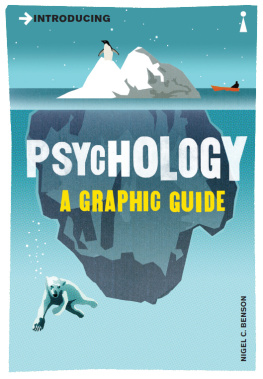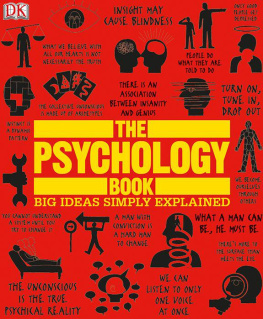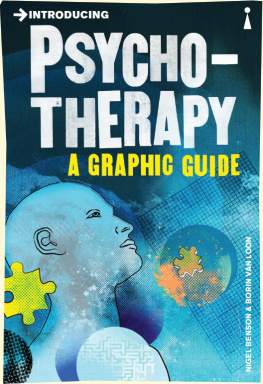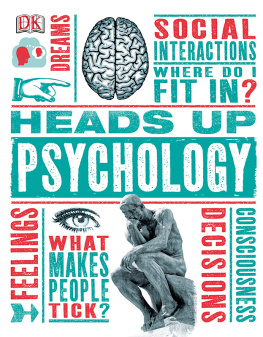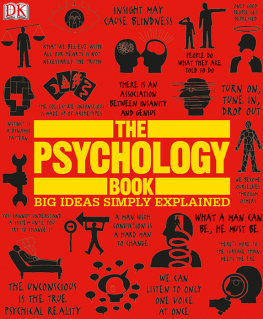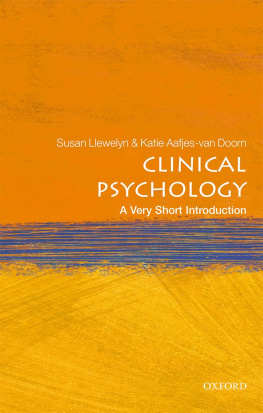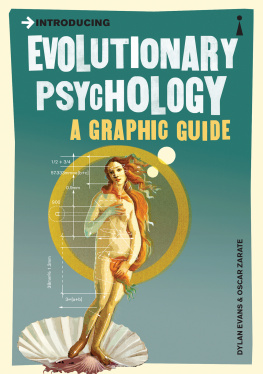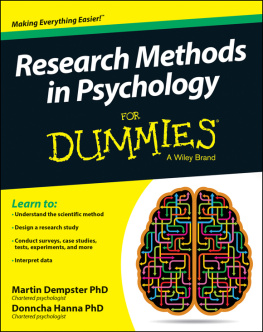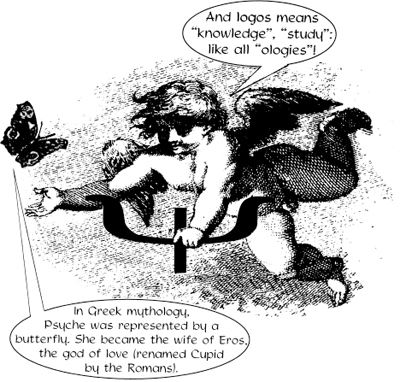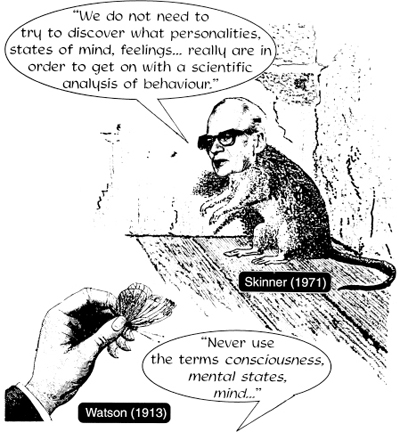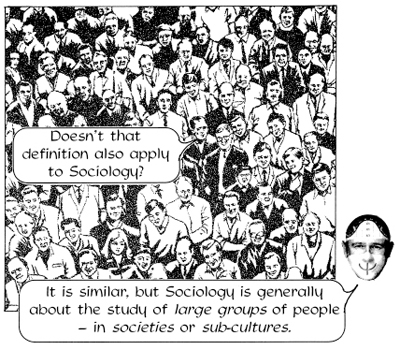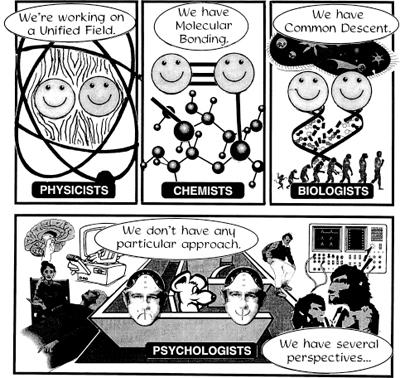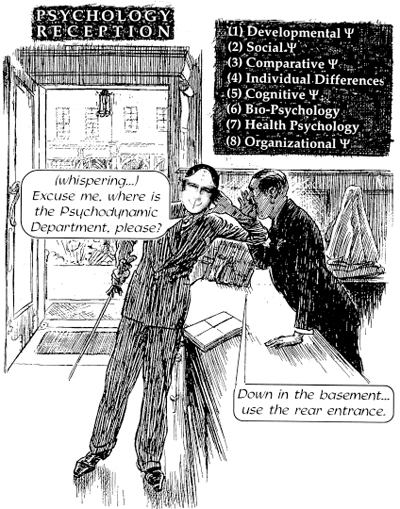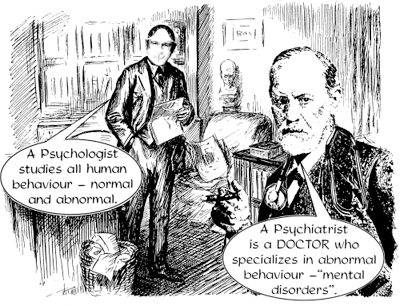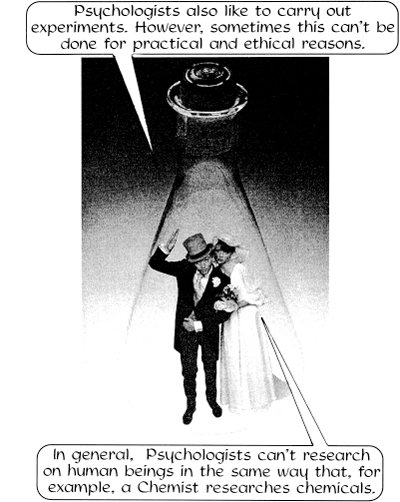Published by Icon Books Ltd, Omnibus Business Centre, 3941 North Road, London N7 9DP
email:
www.introducingbooks.com
Text and illustrations copyright 1998 Nigel C. Benson
The author and artist have asserted their moral rights.
No part of this book may be reproduced in any form, or by any means, without prior permission in writing from the publisher.
And logos means knowledge, study: like all ologies!
In Greek mythology, Psyche was represented by a butterfly. She became the wife of Eros, the god of love (renamed Cupid by the Romans).
The Greek letter (spelled psi, and pronounced sigh) is now used as the international symbol for Psychology.
Hence, Psychology was originally defined as: the study of the mind.
But, this isnt how most Psychologists define Psychology today.
Towards a Definition
Most Psychologists try hard to make a clear distinction between what is proper Psychology, and what isnt.
So, how do Psychologists define Psychology? Well, there are difficulties in finding one universally accepted definition. Although most Psychologists agree that it is important to be scientific to avoid muddled thinking its not always clear exactly what this means.
Another difficulty is the practical problem some say impossibility! of studying the mind directly. Indeed, even trying to define mind is very difficult. Some Psychologists have avoided this completely, especially the Behaviourists, like B. F. Skinner and J. B. Watson.
We do not need to try to discover what personalities, states of mind, feelings really are in order to get on with a scientific analysis of behaviour.
Never use the terms consciousness, mental states, mind
In practice, therefore, most Psychologists concentrate on what is observable and measurable in a persons behaviour, including the biological processes in the body. At the same time, despite the extreme views of certain Behaviourists, the mind is still generally considered to be central to the subject.
Thus, a commonly accepted working definition is:
Psychology is the scientific study of the mind and behaviour of humans and animals.
Doesnt that definition also apply to Sociology?
It is similar, but Sociology is generally about the study of large groups of people in societies or sub-cultures.
Psychology, on the other hand, is mainly about individuals or small groups of people, as in Social Psychology.
There are also differences in the methods used. In Psychology, there is emphasis on experiments, but in Sociology that method is not usually possible for practical and ethical reasons so observations and surveys are more commonly used.
What Does Psychology Include?
Unlike the Natural Sciences, Psychology doesnt have one unifying theory or particular approach
Were working on a Unified Field.
We have Molecular Bonding.
We have Common Descent.
We dont have any particular approach.
We have several perspectives
We shall look at the 6 main approaches or perspectives within Psychology:
PSYCHODYNAMIC; BEHAVIOURISM; COGNITIVE (including Gestalt); HUMANISTIC; BIO-PSYCHOLOGICAL; SOCIAL-CULTURAL
The Sections Within Psychology
In addition to the different perspectives, the subject can be divided into various areas of study in university departments. A typical division would look like this:
(whispering) Excuse me, where is the Psychodynamic Department, please?
Down in the basement use the rear entrance.
To qualify as a Psychologist requires a recognized qualification at degree level (e.g. BSc Hons) and membership of a relevant Professional Association, for example one of the following:
the BPS British Psychological Society (founded 1901),
the APA American Psychological Association (founded 1893),
the APS American Psychological Society (founded 1988).
Psychology and Psychiatry?
There is a common confusion between the two. Put simply, the difference is this:
A Psychologist studies all human behavior normal and abnormal.
A Psychiatrist is a DOCTOR who specializes in abnormal behavior mental disorders.
Psychiatrists have a Medical Degree, plus a Psychiatric Qualification, and belong to a Medical Association. (Only they have the authority to prescribe drugs.) But some Psychologists also specialize, with extra training, in helping people with mental disorders they are Clinical Psychologists.
To qualify as a Clinical Psychologist requires a good Psychology Degree (at least a 2.1) plus relevant work experience (e.g. nursing, social or care work) and a recognized Clinical qualification (e.g. a BPS approved Diploma or Masters Degree).
Some Clinical Psychologists base their therapies, like traditional Psychiatrists, on Psychoanalysis (e.g. the Tavistock Clinic), while others use Behaviour Therapy and Modification (e.g. the Maudsley Clinic). (These therapies are described later.)
Is Psychology a Science?
Since the definition includes scientific study, this begs the question: What is Science?. To most people, science conjures up images of laboratories with test-tubes, complex measuring equipment, etc. This is appropriate because it emphasizes the importance of EXPERIMENTS, which can only be properly carried out in controlled conditions.
Experiments are conducted to try to find the CAUSES of EFFECTS, in all scientific subjects.
Psychologists also like to carry out experiments. How/ever, sometimes this cant be done for practical and ethical reasons.
In general, Psychologists cant research on human beings in the same way that, for example, a Chemist researches chemicals.
So, Psychologists have to use various research METHODS other than just experiments.
METHODOLOGY

